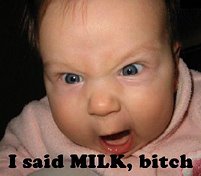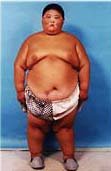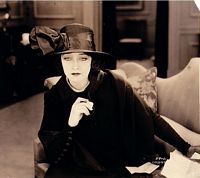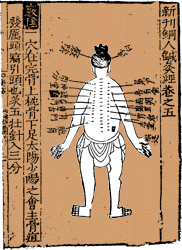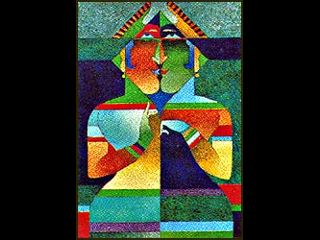
Have you ever wondered what Yin-Yang is all about?
Well, lets just say its about everything.
The concept spans to every corner in Oriental culture, philosphy, art, and even medicine.
Its like putting on yin-yang glasses and seeing things in a differnt light.
Many people believe Oriental medicine to be of no scientific value since the explanations about Oriental Medical principles are expressed in non-modern terms such as Yin-Yang.
However, its concepts should not be rejected just because people do not understand them.
The concept of Yin-Yang is radically different from Western logic which is based upon the opposition of contraries. According to Aristotelian logic, which has dominated Western thought for thousands of years, contraries (such as "the sky is blue" and "the sky is not blue" cannot both be true.
The theory of Yin-Yang holds everything has two opposite aspects. Each thing could be itself and its opposite. The Yin-Yang nature of a phenomenon is not absolute but relative. This lack of concrete objectiveness allows an individual to observe and interpret phenomena in a constant state of change.
This differentiation is the approach Oriental medicine uses to conceptualize the human body to explain its physiology and pathology and to guide clinical diagnosis and treatment.
Unlike Western medicine, which uniformly categorizes disease and follows universal protocols in its treatments, not one human body is believed to be the same as the next. By clearly classifying physical constitutions and individual differences, treatment methods are established based solely on the individual.
In Oriental medicine, the theory of Yin-Yang serves to explain everything in yin and yang qualities. From the organic structure of the human body as well as the nature of its functional activities, to the pathogenic factors which cause disease.
Disease results from the loss of relative balance between yin and yang, being in excess or deficiency of either.
The following is a descriptions of the physiological manifestations of yin and yang. See if you can pick up a pattern...
Excess Yang (Deficiency Yin):
1. High body temperature, likes coolness
2. Red face
3. Red Tongue
4. Restless and fidgets
5. Demands lots of water, especially cold
6. Likes plain and cool food
7. Urine is dark, scanty, and infrequent
8. Becomes easily constipated
9. Loud voice, likes to talk
10. Strong exhalation
11. Likes cold season
12. More tired after sunrise
13. Feels refreshed after sunset
14. Body is comfortable on cloudy days
15. Dislikes bright light
16. Feels worse around three o'clock in the afternoon
17. Insomnia
18. Throws off bed sheets
19. Likes to lie stretched out
20. Intense emotional activity and has difficulty staying calm
Excess Yin ( Deficiency Yang):
1. Low body temperature, likes warmth
2. Pale face
3. Pale tongue
4. Slow to move, lethargic
5. Has little thirst and likes warm water
6. Likes warm and spicy food
7. Urine is clear, copious and frequent
8. Tends to have diarrhea or loose stools
9. Weak voice, likes to stay quiet
10. Strong inhalation
11. Likes warm season
12. More refreshed after sunrise
13. Has no energy after sunset
14. Body is comfortable during clear days
15. Likes bright light
16. Feels worse around five o' clock in the morning
17. Tends to be sleepy
18. Likes to be covered
19. Likes to be curled up
20. Timid and has difficulty asserting oneself
Since the distinctions of Yin-Yang can be found in the physical constitution, in the conditions of a disease and in the properties of a herb, naturally the disease can be eliminated by applying these Yin-Yang principles to regain balance and health.
By using the concept of Yin-Yang, this is how T.C.M achieves health. It's all about balancing Yin-Yang.
